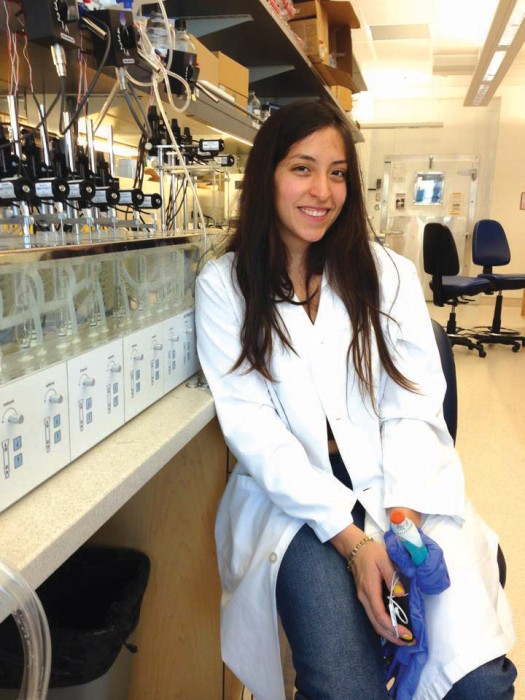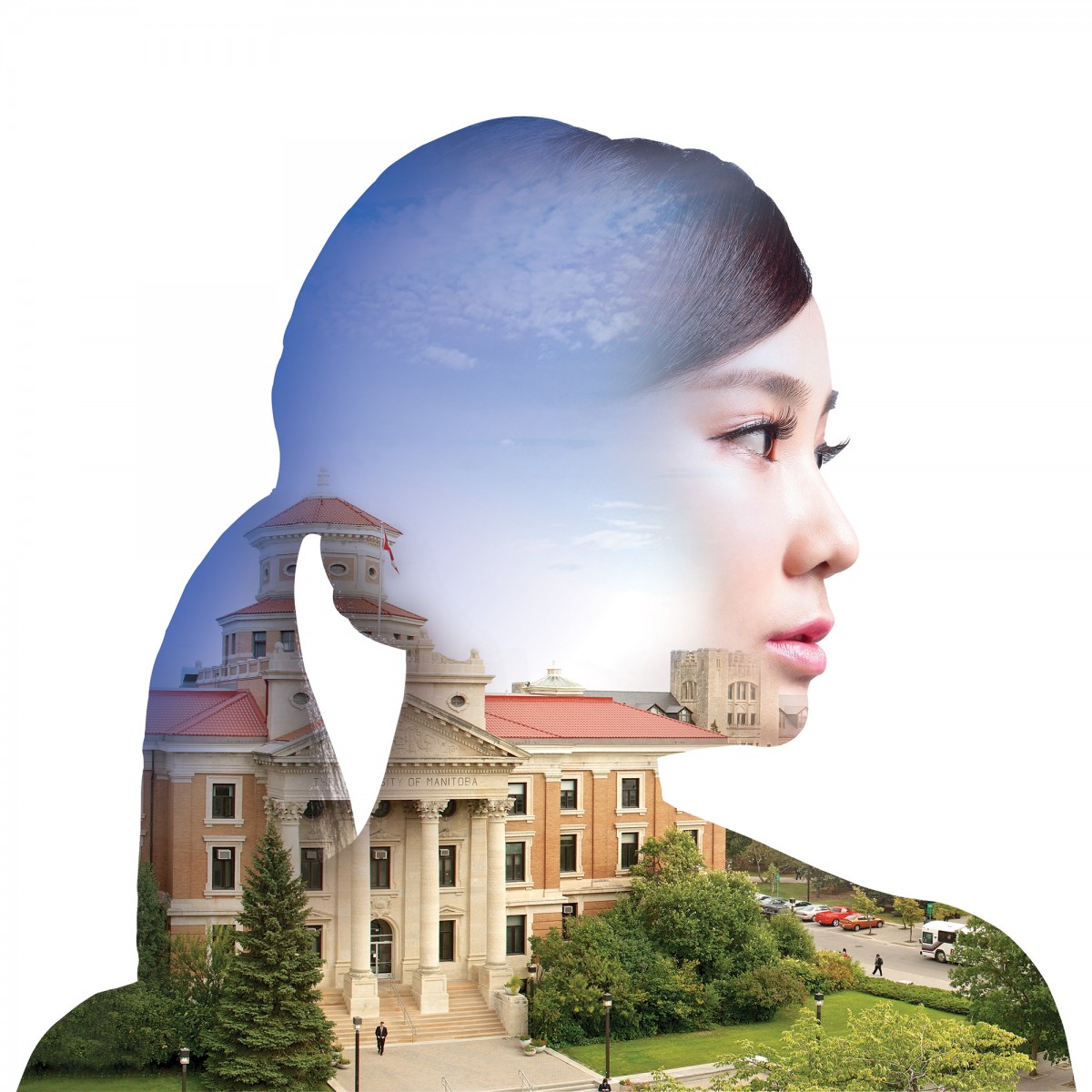One night last fall, armed militants came to Montaser Al Jajeh’s home in Syria and took his father. They made up charges to detain him and moved him to an undisclosed location. Soon, word got out that they were also looking for Al Jajeh. It was then that he officially became a refugee. Though safe from the regime in neighbouring Jordan, Al Jajeh was now one of more than 4.7 million people displaced by the Syrian civil war. He was homesick—born and raised in Damascus, he calls the city “the most beautiful place on the planet.” And he was troubled by the world’s view of Syria as nothing more than a battleground: “The crisis needs to be covered, but it saddens me to see that that is the only image other countries are getting from Syria.” He knew there was no going back—not yet, at least—and he wanted desperately to continue his education.
Hope came in the form of a Facebook post about the World University Service of Canada (WUSC) Student Refugee Program—a unique resettlement program that gives refugees the opportunity to pursue post-secondary education at Canadian institutions. He applied and was accepted. And just as the tragic image of a dead toddler lying face down on a Turkish beach was awakening the world to the tragedy of the Syrian refugee crisis, Al Jajeh received word he would be going to the University of Manitoba. “That was when I started to see life in colour again,” he says.
DREAMS REVIVED
Students at the U of M have been sponsoring refugees through WUSC for more than three decades. Through student fees and funding from the university and the U of M Students’ Union, the local WUSC committee pays for two years of tuition as well as living and travel expenses, and provides a social and emotional support system that helps refugee students transition to life in Winnipeg.
Although Al Jajeh is one of only 27 refugees to arrive through the program in the past 35 years, he joins a community of more that 4,400 international students from over 100 countries. Each student has a unique story to share, but they are all bonded by having made the bold decision to leave their home communities to pursue their dreams at the U of M.
And what they discover quickly is that taking that first big leap is just the first of many challenges to come. According to Tony Rogge [BA(Adv)/93], director of the U of M’s International Centre for Students (ICS), the challenges go way beyond language barriers. He describes it as “total immersion in a different academic cultural context.”
Students must adjust to everything from the new academic culture, customs, and regulations at the U of M —Rogge says we often forget the institution itself has a very specific culture and every international student sees it through their own cultural lens—to the Manitoban climate and North American food.
PARALLEL COMMUNITIES
“I see St. Johns [College] as my bedroom, the gym as my playground and University Centre as my dining room. But the whole university is my home.”
Viri Urena Ramirez [BSc(Hons)/13] smiles and laughs a lot. The graduate student is expressive and easy-going. Wearing jeans and a loose-fitting Bisons’ hoodie, she is clearly relaxed and at home. “I see St. Johns [College] as my bedroom, the gym as my playground and University Centre as my dining room. But the whole university is my home.” When not in the lab working on her master’s in biotechnology, Ramirez can be found scaling the climbing wall at the Active Living Centre, or cooking authentic Mexican tacos for her friends. She not only learned how to swim here, she can now scuba dive like a pro. And she’s become a top recruiter for the U of M Space Applications and Technology Society—a student group that wants to launch a micro-satellite into space.
As comfortable as she is now, she didn’t always feel this way. When she arrived in Manitoba, she was confronted with feelings of isolation and a loss of identity. “I came here and nothing was easy for me. You’re not from Canada, you’re Mexican. Then you go back home and you’re not Mexican anymore. You’re in this limbo where you don’t belong anywhere.”
For Urena, things turned around in her second year. She moved into residence, hung her beloved Mexican flag on a dormitory wall and started to connect with other students who helped introduce her to many of the U of M’s supports and services. In effect, she joined a community.

Viri Urena Ramirez // PHOTO BY JESSICA MANN
A GROWTH STRATEGY FOR EDUCATION
With one in every 50 students worldwide choosing to study abroad, universities need to adapt. And they are. International student enrollment has become a top priority for 96 per cent of Canadian universities, including the U of M, where the international student population has doubled in five years and increased six-fold since the turn of the millennium.
Those international students come from all over the globe—the majority from Asia (2,681), more specifically, China (1,837)—and the U of M is working to diversify its international student population even more by increasing its presence within international recruiting circles online and in the field.
Lisa Kachulak-Babey, the U of M’s director of student recruitment, has attended international education fairs in China, India, Malaysia, Singapore, Vietnam, Tanzania and Nigeria (to name a few) and discovered that even in the most faraway countries many prospective students already know about the U of M.
“We’re kind of a big deal abroad,” says Kachulak-Babey. The U of M attracts international students for a number of reasons, not the least of which is the reputation of Canada, Manitoba, and the university community as tolerant and safe places to live.
Providing top-tier international student experience is a key priority across the campus, from faculty deans and department heads to Student Affairs, which has recently created new positions to support international students. The challenge, according to Rogge, is getting all parties to work in tandem.
“We want to do our best to make sure students are able to achieve success in their academic program, realize their professional goals, and graduate,” he says. “It’s not much different from Canadian students.”
The effort is worth it for both students and the U of M: International students get to fulfill their academic goals and enrich the community, and the university gets the benefits of a diverse campus while adding to the debit column at a time when government funding for higher education is ever-dwindling.
Currently, international student fees contribute nearly $5 million to the U of M’s operating budget, and international education on the whole adds approximately $8 billion to the Canadian economy each year—more than the aerospace industry.
It’s a virtuous circle. Eventually international students become members of our international alumni community, helping the university extend its reach and impact globally. A global community that helps recruit the best students from around the world and provide a global support network of graduates.
FINDING COMMUNITY
The significance of community support—while in school and once graduated—is something alumna Rita Mui Goodridge [BComm(Hons)/82] knows well.
The president of the Hong Kong Alumni Association, Goodridge was once among the thousands of students who left Hong Kong in the 1970s to be educated in the West. “My parents were migrants from China,” she says. “Because they were illiterate, they very much wanted their children to have an education.”
After four years abroad, Goodridge returned to Hong Kong having developed a network of friends that connected her to the alumni association and even informed her career path—a former classmate helped Goodridge get her first job in advertising, which led to the start of long career in print and TV advertising. She is currently the regional vice president of sales for Fox Network Group in Hong Kong.
With over 1,300 U of M graduates in the region, Hong Kong is home to the largest alumni population outside of North America. For more than three decades, the association has brought the community together to nurture friendships, create networking opportunities, and provide support to new graduates. They have set the standard for U of M alumni groups across the globe because they recognize the benefit of their community.
“There’s strong bonding when you have a common background,” Goodridge says. “We all came from the University of Manitoba. The university shaped us into what we are today.”







